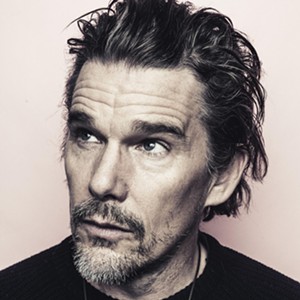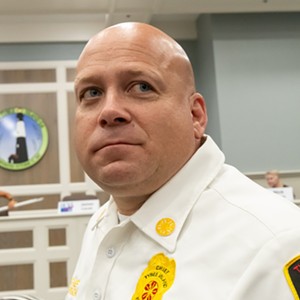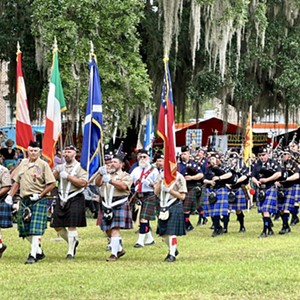One of the coolest “gets” by this year’s Savannah Music Festival must surely be Saturday night’s exceedingly rare chance to catch the genre-hopping master banjoist Béla Fleck joined by four of the most revered traditional African musicians alive today for an evening of multi-cultural string and percussion music.
A repeat attraction at the SMF, Fleck is a musician’s musician who has reportedly been nominated in more different Grammy Award categories than any other performer in history (he’s also taken home ten of those shiny statues). Whether appearing worldwide with his longtime band The Flecktones, or collaborating with a staggeringly diverse —and ever increasing— group of A-List players from the worlds of rock, folk, funk, blues, jazz, country, bluegrass, soul, jam, world-beat and classical, Fleck is an omnivorous picker and gregarious showman whose passion for testing the boundaries of his chosen instrument is permanently on display.
His brand-new CD Throw Down Your Heart is a companion piece to the recently completed film of the same name, which documents Fleck’s travels across Africa in search of the little-known roots of the banjo. Along the way, he met, befriended and recorded traditional African music with some of that continent’s top players, some of whom are accompanying him on this short U.S. tour.
I spoke with Béla by phone just before the launch of the tour.
You’re a repeat performer at the SMF. What is it that keeps bringing you back to this particular festival?
Bela Fleck: Oh, it’s exactly the kind of festival I like to be a part of, because it embraces all different types of music. That’s a beautiful thing. I embrace all kinds of music in my life as well, so I feel like I really fit into diverse festivals such as this one.
As someone who plays all over the world, and in all sorts of venues and situations, how would you describe the mood and atmosphere of the SMF from the point of view of an artist, as opposed to the perspective that we may get as audience members? In other words, are there any other festivals you would compare or contrast this event to, and are there any aspects to this festival that seem completely unique to it alone?
Bela Fleck: Well, I think there is a laid-back quality and some of the character of the town itself in the Festival. When you play different festivals, it’s kind of hard to separate the location from everything else. When you play Telluride, you’re in those beautiful mountains. When you’re in Savannah, it has a sleepy feel to it that I think makes people very comfortable performing. I would also say it’s a big-deal gig that doesn’t feel like a big-deal gig, know what I mean?
A big deal in the sense that it’s important for a career or noteworthy in some other way?
Bela Fleck: Noteworthy. I mean, you’re playing in a cast of important musicians who have been very carefully chosen. Plus, it’s a big room. But you don’t feel as uptight as you do in big markets like NYC. I actually think that I do better when I’m playing in that kind of an environment.
Does the kind of atmosphere in the room or the town have a noticeable impact on the kind of improvising you do onstage?
Bela Fleck: I think it does. I think it’s better when it’s like that! (laughs) The only impediment I have to improvising is when I might feel uptight or stressed out for some reason or another. The more it feels like a relaxed situation, the better I do. I prefer the feeling of those kind of gigs. One giveaway as to why I think it’s a great gig in my mind is that when I look at the Savannah Music Festival’s roster, I see a ton of great people that I’d love to go see myself! Of course, I can’t always go to see them, but last year I got to see Marcus Roberts play. I love him. Then I actually got to sit in and play with him. Man, Chick Corea and John McLaughlin, I’d give anything to be able to sit in the audience and watch that show. And then, Zakir Hussain is one of the best, and to be able to play with him as well as see him play is an amazing opportunity for someone like myself.
For this appearance, you’ll be showcasing on the music you made alongside some of Africa’s master musicians during a trip throughout that land in search of the roots of your chosen instrument. The resulting sessions are frequently described as being some of the most “meaningful music of your career.” Is one meant to infer it’s some of the most meaningful to you personally, or that listeners are connecting with these recordings in greater numbers or on a deeper level than most of your previous work - or both?
Bela Fleck: Um, well, I think what that means is that the guys who are writing about it really like it. (laughs) They’re trying to find a superlative way to describe something they really enjoy. It makes me happy they like it so much. IN America we’re always so concerned with what’s the best: this is the best, no, that’s the best. I’m not prepared to put something down to lift something else up, but I can tell you I’m extremely proud of this project. One other thing I have to say I’m very thankful for is that we’ve gotten more amazing press in the first week of this recording’s release than I’ve received for perhaps any album or project I’ve ever done. USA Today, the L.A. Times, New York Times, Billboard Magazine, Reuters, they’ve all written pieces on this within the first two days of the album coming out. I’m reading some of the bets reviews of anything I’ve ever done, and it feels pretty ridiculous. But people are embracing it, which makes me happy, because I was the producer of this. Sony was originally gonna do this with me, but they backed out of the project just a month and a half before we were ready to go. The plane tickets were already bought, and I was forced to pay the bills. I’ve been paying them ever since, and let me tell you, I could have bought a house —a nice house— with that money! But I think in retrospect, it’s money well spent. The whole thing: bringing a crew of five people to all these countries, paying all the musicians fairly, the travel, the cost of making a film, paying the editors. You know, we actually took over the editing ourselves, me and my brother. There was just one cost after another and it really mounts up into the hundreds of thousands very quickly. The benefit of doing it ourselves though, was that nobody was over our shoulder saying, “oh, your record needs to be this,” or “your movie needs to be that.” It was strictly up to us. On an artistic level, we could make the album and the movie we wanted to make.
Why did Sony back out?
Bela Fleck: Here’s the deal: my brother’s name is Sasha Paladino. He’s about 17 years younger than me. He’d come out as a road manager with me and Edgar Meyer when we needed someone to do that job and he was out of work at the time. During that tour, he shot a short little film about us that Sony loved. They said you have to take Sasha and film this Africa thing while you’re doing it. Now, that first film was done on a shoestring budget with just one camera. But once we started thinking about Africa, we knew it couldn’t be like a student film. We knew we had to do this the real way with a sound crew and a wonderful African director. By the time Sony saw the budget, it was a big budget. I think it just surprised them They said, “oh, we didn’t know it would be like this!” Now, I could have split the cost of it with them, but then they would have owned it completely. They just wound up pulling out altogether, and now everyone who was working there then is gone. Since then, the record business has fallen into the toilet. I actually have to thank the guy at Sony who said it was a great project and encouraged me to get Sasha to do this. Sony and the rest of those companies had been sailing on the Titanic thing for so long and they had made a lot of money on that. But at this point, the music business was starting to shrivel up. Peter Gelb was at Sony. Now he runs the Metropolitan Opera. He did right by us. He very wisely left Sony just before things went really badly. He had a great track record and left with a great reputation and wasn’t part of this mess. I don’t have any hard feelings with him.
How long ago did the idea of travelling to Africa to pursue this education and collaboration actually originate - and was there any particular turning point that actually led you to make good on this pursuit?
Bela Fleck: Good question. I can’t tell you exactly when I first thought about it, but I’d known since the earliest days of my career that the banjo came from Africa , and I always wondered if anyone over there still played it. Over the years, whenever The Flecktones had a few weeks break, I’d run off and make another little side-project record. When the band all decided mutually to take a year off, I suddenly realized I actually had the opportunity to come up with something really big to do. A real high jump, you know? And it hit me that the thing I’d always wanted to do was go to Africa and record over there. I convinced my brother to do it —which wasn’t hard— and then Peter Gelb said yes. I thought it was a good idea, but to have Sony agree with me on that was when it really started to take shape. I wanted a great adventure, so we went.
Do you recall how you felt when you first arrived in Africa to begin this project, with cameras in tow?
Bela Fleck: I was very hot and petrified.
Were you filled with a lot of anxiety?
Bela Fleck: Oh yeah. I tend to be anxious at times anyway. What’s interesting is as you watch the film, I get more and more tired looking the more relaxed I get in my playing. We were on an amazing schedule: 18-hour days at a time with travel and filming and then traveling back. There was all sorts of craziness going on.
Are you pleased with the final results?
Bela Fleck: Yeah! I love the film and the album. And they’re quite different. There are things in each that are not in the other. We came back with about 250 hours of film and 40 pieces of music that we’d recorded.
It must have been overwhelming. Had you ever been to Africa before?
Bela Fleck: It was. I had been to South and North Africa, but never to the center.
Was there ever any concern that having a documentary crew along for the experience would get in the way of your own enjoyment or devotion to the task at hand?
Bela Fleck: Well, the main thing about it was that it was my brother running the show. Because of that, I had a lot of trust in him. I could basically ignore the camera. He would call the shots and I could get lost in the interactions with the people.
Are you pleased with the final results of the film itself?
Bela Fleck: Yeah! I love the film and the album. And they’re quite different. There are things in each that are not in the other.
Was it difficult to set up meetings with these African musicians? Was that arranged in advance, or did you literally go over there blindly, in the hopes of meeting people and making connections that might lead to collaborations?
Bela Fleck: No. We set up every possible thing we could and then we left room for spontaneity on the perimeter. Every day was very expensive. I had six people working for me every day and all the equipment, and all the media we’re filling up with footage and audio. We can’t just burn up money, because now it’s my money! (laughs) So, we tried to get the most out of it so when we distilled it down to the best stuff it would be awesome. We came back with about 250 hours of film and 40 pieces of music that we’d recorded.
And then you slept!
Bela Fleck: Yeah. When we got back we were very relieved. Nobody got hurt, nothing was stolen and only one tape was missing. We never found that one.
Did your reputation as a musician and songwriter precede you in any way over there, or were you essentially an unknown commodity in that music world?
Bela Fleck: Well, you know, it’s funny. When you win Grammys, it’s kind of hard to put your finger on what that means and how it might help you in life. But this was one of those moments. They’d say who’s Bela Fleck and be told, well, he has eight grammys —or however many it was— and they showed up with some sort of respect for that accomplishment. But they didn’t know anything of my music.
I’m assuming you wound up being surprised? Were they surprised as well?
Bela Fleck: I think they had a sense that I was coming from an okay place on a personal level. Because I was trying so hard to get their music right. They probably found me as interesting and exotic as I found them.
Looking back, what was the single biggest surprise you received during your trip and the resulting music making? Did anything you came across blow your mind and shatter any preconceived notions you had going into the whole thing?
Bela Fleck: You know, there’s this one element that I wasn’t expecting. I want to say this in a way that is correct and appropriate. As a white man in the U.S., there’s a dynamic between white people and black people here due to the fact that black people were once slaves here. Even though I have black friends who are some of very closest friends, there is a kind of underlying guilt that I have. I’m not saying this is rational, but I realize that it’s there. What surprised me was that in Africa, that feeling was completely gone! I simply had no such feelings, and I couldn’t tell you if that was because of me or the people over there. It was very refreshing to not feel that elemental guilt from the past. Even though there are many very good reasons for those feelings over there as well. But I didn’t feel it at all, and I don’t think they felt it either. I don’t think they were looking at me as part of the race that enslaved some of their people. Because the people that are still there don’t carry the same burdens that descendants of slaves carry. Their family got to be home. They grew up in their own country. So, they wouldn’t have the same feelings as someone whose history is bound up in being uprooted without their permission. There are resentments here that do simmer under the surface — and those resentments are not unfounded.
They’re completely legitimate.
Bela Fleck: Yes, they’re legitimate. The unfair things that have been done to black people in this country, it’s hard to count them all. I didn’t realize how much of that was affecting me until I got there. When I returned, I found myself not quite falling into that role as easily as I might have before. I wouldn’t make too much out of this, but it is an interesting emotional side note to the whole experience. What I feel bad about is the unfair things that have happened to black people over and over again just because of their color. But I don’t feel as responsible for that as I once did. My family had their own travails, coming over from Eastern Europe and all that.
Nowadays, since the Buena Vista Social Club and the influence of the internet on bridging the cultural gaps between ethnic and indigenous folk music and the international listening audience, this sort of cross-pollination of musical ideas is increasingly more common that it was even just a couple of decades ago.
Bela Fleck: Absolutely, and this trip couldn’t have been done on this level and this easily even a few years ago. Not that there weren’t plenty of challenges. Ten years earlier, or the farther back you go, just getting over there with cameras and film and tape stock and getting around and learning about these musicians would have been nearly impossible. That’s one of the great things about the internet is it allows you to locate and connect with people so much easier.
Tell me a bit about the kind of show that folks in savannah will be treated to, and how it might differ from the kinds of gigs you are primarily known for — if there even is such a thing!
Bela Fleck: For an overview, we’re presenting an acoustic evening of great African music and collaborations with me. A lot of times we think of African music as drumming and dancing and Afro-pop. This is a very different and special type of show with four incredible artists. One of the great artists in the film is coming over from Tanzania. He is a magical performer on piano and he also sings. The most famous of this group is Toumani Diabati. He’s truly one of the greatest kora players of all time, and one of the most well-known African instrumentalists in the world.
Supposedly, you have been nominated in more categories than any other musician in Grammy history. This to me seems not only an amazing achievement, but even more so impressive considering your chosen instrument is one which many people may assume has a limited range or number of genres it could fit well in. One some level, do you delight in thwarting limited expectations some folks may have for the banjo?
Bela Fleck: Oh, I delight in that. I love coming up with surprises for people. And I love most of all being involved with great music that’s unexpected.
That drives you?
Bela Fleck: It definitely does. The highest on my list is musical expression. Just under that is provocative, interesting settings and collaborations with great players. I love finding people who are like me as well — iconoclastic and serious about their music. I reach out to those players wherever they are.
Well, I hope you have a safe trip, and thanks for speaking with me.
Bela Fleck: Well, I’m looking very forward to it. I’m as curious as everyone else to hear just exactly what it’s going to sound like. I can safely say, however, that these musicians are truly, truly wonderful.
Béla Fleck: The Africa Project
Where: Trustees Theater
When: Sat., 8 pm
Cost: $20 - $45 at savannahmusicfestival.org or the SCAD Box Office
Info: belafleck.com, throwdownyourheart.com




















